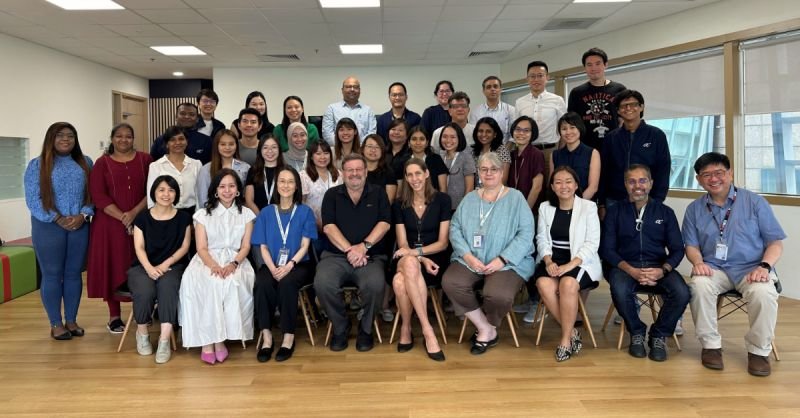Experimental Drug Development Centre (EDDC) Announces Progression of Phase 1 Trial for EBC-129 into Dose Expansion
20 May 2024 | Monday | News

-
EBC-129 is the first made-in-Singapore antibody-drug conjugate (ADC) to enter clinical development. It selectively targets cancer cells across a range of solid tumours.
-
The Phase 1 trial for EBC-129 began with a dose escalation study in May 2023. The trial has entered into dose expansion as of 13 May 2024.
-
With the initial safety and tolerability of EBC-129 demonstrated in cancer patients, the dose expansion part of the study will further evaluate its effectiveness and tolerability in selected solid tumours.
The Experimental Drug Development Centre (EDDC), Singapore’s national platform for drug discovery and development, is pleased to announce that the Phase 1 trial for EBC-129 has progressed into dose expansion.
EBC-129 is the first made-in-Singapore Antibody-Drug Conjugate (ADC) to enter clinical development. The tumour antigen it targets is a specific N-glycosylated site conserved on both CEACAM 5 and 6, which is selectively expressed on cancer cells, over normal cells. This allows EBC-129 to address a broad range of solid cancers expressing either one or both tumour markers, including cancers prevalent in Asia like gastroesophageal and lung cancers, as well as cancers with very limited treatment options like pancreatic cancer and cholangiocarcinoma.
The Phase 1 trial began with a dose escalation study which evaluated the safety and tolerability of EBC-129 in patients with unresectable metastatic solid tumours. The first patient for the dose escalation was dosed at the National Cancer Centre Singapore (NCCS) in May 2023. EBC-129 is also being tested at the National University Cancer Institute, Singapore (NCIS), as well as the MD Anderson Cancer Center and the University of Colorado Cancer Center in the United States. The dose escalation study showed that EBC-129 is well-tolerated by cancer patients. Tumour shrinkage was observed in an oesophageal cancer patient as well as a pancreatic cancer patient.
The Phase 1 trial has now progressed into dose expansion, with the first patient for this part of the study dosed on 13 May 2024. The dose expansion study comprises three groups of 15 patients each with gastroesophageal cancers, pancreatic ductal adenocarcinomas, and solid tumours expressing the tumour antigen at moderate or high levels.
The ADC and the immunohistochemistry (IHC)-based test used for patient selection were developed collaboratively by NCCS, A*STAR’s Bioprocessing Technology Institute (BTI) and the Institute for Molecular and Cell Biology (IMCB), as well as EDDC.
“Our team at NCCS has been very encouraged by the progress of this ongoing trial for EBC-129 which has shown good tolerability and early signs of efficacy in the dose escalation study,” said Clinical Assistant Professor Matthew Ng, Head, Department of Gastrointestinal and Neurological Medical Oncology, NCCS. “We have strong patient interest for participation in the dose expansion study and look forward to the development of EBC-129 as a potential treatment for cancer patients in the future.”
“I am excited to delve deeper into EBC-129’s promise as a therapeutic option for pancreatic and gastroesophageal cancers through the dose expansion study. The demand for safe and effective treatments in these cancer types remains substantial, and we are dedicated to addressing these unmet needs,” said Dr Yong Wei Peng, Senior Consultant, Department of Haematology-Oncology, NCIS.
“We are thrilled by the positive developments we have seen in the dose escalation study, and grateful for all our collaborators as well as the team at EDDC, who have been instrumental for us to reach this milestone“, said Prof Damian O’Connell, EDDC’s Chief Executive Officer. “We will continue to work with our clinical partners to progress the dose expansion study and advance the potential of EBC-129 as an effective, targeted therapy for cancer patients.
Most Read
- Innovations In Magnetic Resonance Imaging Introduced By United Imaging
- Management of Relapsed/Refractory Multiple Myeloma
- 2025 Drug Approvals, Decoded: What Every Biopharma Leader Needs to Know
- BioPharma Manufacturing Resilience: Lessons From Capacity Expansion and Supply Chain Resets from 2025
- APAC Biopharma Review 2025: Innovation, Investment, and Influence on the Global Stage
- Top 25 Biotech Innovations Redefining Health And Planet In 2025
- How Health Systems Are Reshaping Drug Adoption, Partner Models, and Market Access in 2026
- The New AI Gold Rush: Western Pharma’s Billion-Dollar Bet on Chinese Biotech
- Single-Use Systems Are Rewiring Biopharma Manufacturing
- The State of Biotech and Life Science Jobs in Asia Pacific – 2025
- Asia-Pacific Leads the Charge: Latest Global BioSupplier Technologies of 2025
- Invisible Threats, Visible Risks: How the Nitrosamine Crisis Reshaped Asia’s Pharmaceutical Quality Landscape
Bio Jobs
- Sanofi Turns The Page As Belén Garijo Steps In And Paul Hudson Steps Out
- Global Survey Reveals Nearly 40% of Employees Facing Fertility Challenges Consider Leaving Their Jobs
- BioMed X and AbbVie Begin Global Search for Bold Neuroscience Talent To Decode the Biology of Anhedonia
- Thermo Fisher Expands Bengaluru R&D Centre to Advance Antibody Innovation and Strengthen India’s Life Sciences Ecosystem
- Accord Plasma (Intas Group) Acquires Prothya Biosolutions to Expand Global Plasma Capabilities
- ACG Announces $200 Million Investment to Establish First U.S. Capsule Manufacturing Facility in Atlanta
- AstraZeneca Invests $4.5 Billion to Build Advanced Manufacturing Facility in Virginia, Expanding U.S. Medicine Production
News











